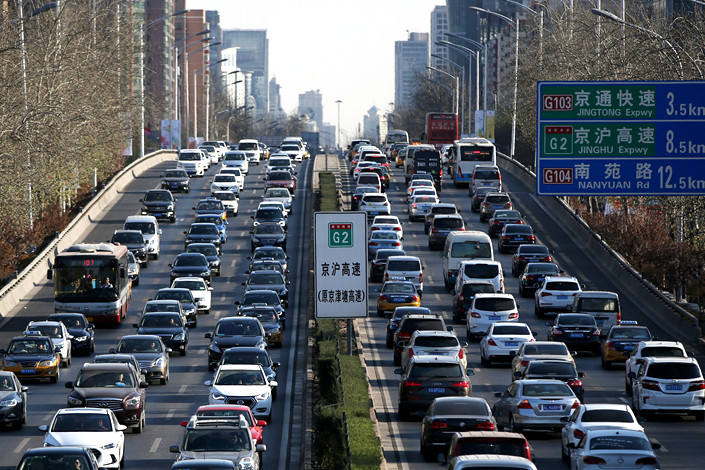Beijing Should Ban New Conventional Car Sales by 2030, Think Tank Says

Beijing should steer Chinese cities toward clean air by banning the sale of new fossil fuel-powered vehicles by 2030, a think tank has said.
The capital could galvanize the rest of China’s megacities by becoming the first to ban the sale of new fossil fuel-run buses, shipping vehicles and taxis in the coming years. It should then ban the sale of new conventionally powered private cars by 2030, the Innovation Center for Energy and Transportation said in a report released this week.
The report forecast that gas vehicles’ days are numbered in China, with sales expected to peak around 2025. Hybrid and pure-electric vehicles will gradually take the lead from that point on, with pure-electric models likely to make up 85% of the market by 2050. Banning new gas vehicles would speed up the process while helping to clear the capital’s air, the report said.
The southern province of Hainan has already proposed steps to phase out fossil-fuel cars used by government and Communist Party departments and has already decided on a ban on sales of fossil-fuel vehicles to residents by 2030.
Yet with a population of 9.1 million, Hainan is not a major automobile market like the capital, whose population is more than twice as large as the tropical province’s. Beijing took the lead in automobile controls in 2011 when it introduced a lottery system for registering new vehicle license plates as car ownership surged. Other cities then followed. Beijing could lead again by banning the sale of traditional fuel vehicles, the report said.
Xin Guobin, vice minister of the Ministry of Industry and Information Technology (MIIT), announced in September 2017 that the government was researching a nationwide ban on new fossil fuel vehicle sales, although progress has been slow in part due to an industry backlash.
The engine has nevertheless continued to sputter for China’s market for new cars, which suffered its first annual decline in more than two decades last year. Passenger car sales in the world’s biggest market fell 6% to 22.7 million for the year, according to the China Passenger Car Association (CPCA).
On the other hand, new-energy vehicle sales surged by more than 60% last year to 1.25 million units, while the used car market grew by 11.5% to 13.8 million, according to the China Automobile Dealers Association.
Speaking at the launch of the report, Li Wanli, a former deputy inspector at the MIIT, told Caixin that the outlook for new-energy vehicles such as pure-electric, hybrid and hydrogen types remains unpredictable, and that it would be inappropriate for the government to try to set one particular model for phasing out fossil-fuel vehicles.
Yet Chen Qingtai, chairman of the China Electric Vehicle Association, said that while the government should not focus too much on the technical aspects of what proportion of vehicles should come from what type of engine, it should formulate an overall goal to reduce pollution and emissions.
According to data from the Beijing government, the city was home to 6.08 million cars as of the end of last year, 5.9 million of which were fossil-fuel vehicles.
Contact reporter David Kirton (davidkirton@caixin.com)

- PODCAST
- MOST POPULAR







